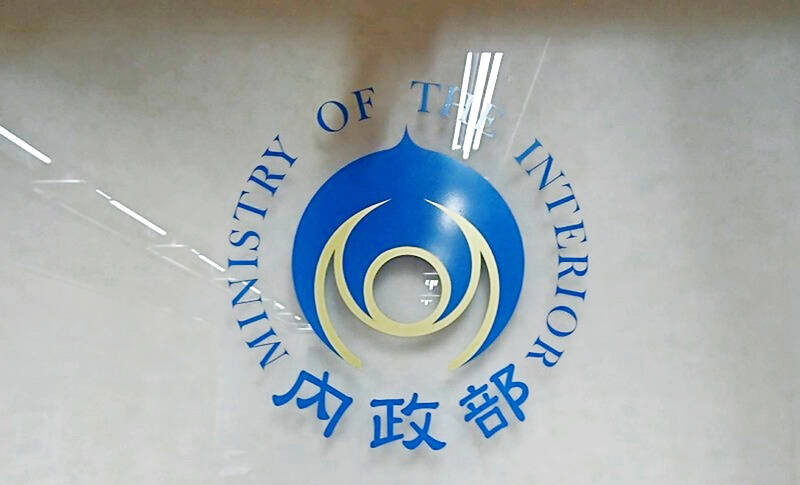Taiwanese who accept money from foreign sources to start a political party could undermine national security and contravene anti-infiltration laws, the Ministry of the Interior said yesterday in response to reports that entertainers and celebrities had been solicited to join a political party with alleged Chinese backing.
Singer Alexis Ho (何以奇) and musician Hsieh Ho-hsien (謝和弦) said that they were among the Taiwanese entertainers who received a letter urging them to join a political party allegedly backed by NT$450 million (US$13.9 million) from overseas sources.
The ministry said in a statement that anyone who forms a political party or develops a networking organization at the direction of foreign entities or with financial support from abroad could contravene the National Security Act (國家安全法) or the Anti-Infiltration Act (反滲透法).

Photo: Huang Hsin-po, Taipei Times
The National Security Act prohibits “initiating, funding, hosting, manipulating, directing or developing an organization” for “a foreign country, Mainland China, Hong Kong, Macau, foreign hostile forces or various organizations, institutions, or groups established or substantially controlled by them,” the ministry said.
It added that under Articles 3 and 4 of the Anti-Infiltration Act, anyone who gives funds or receives donations to engage in elections, recall campaigns or referendums at the instruction or commission of “sources of infiltration” face a maximum prison sentence of five years and a fine of up to NT$10 million.
The ministry urged people to refuse solicitations from China to engage in political activities, which it said would make the participants “pawns in Chinese ‘united front’ tactics against Taiwan,” and also put them at risk of prosecution.
Democratic Progressive Party (DPP) lawmakers said it is no secret that Taiwanese entertainers and social media influencers were making money from endorsement deals in China or being paid to promote tourism there or appear on TV shows.
Such entertainers and influencers should be required to inform their viewers about their Chinese sponsors in their YouTube and social media content, DPP Legislator Michelle Lin (林楚茵) said.
“Many of them are traveling to China to produce propaganda, making videos showing how ‘wonderful’ China is, how enjoyable their experiences there are and how safe its cities are. It is because they receive money from their ‘Chinese sugar daddy’ to endorse the country as a commercial product,” Lin said.
She said Taiwanese influencers were essentially being paid to create pro-China content.
“Our government must come up with measures to require influencers to reveal their financing and the sources behind their videos,” she said.
DPP Legislator Lai Jui-lung (賴瑞隆) said that Beijing’s “united front” tactics have permeated the entertainment industry and cultural sectors.
“Through the promise of earning money and access to China’s market, Beijing is attracting Taiwanese entertainers and social media influencers,” Lai said. “Now, China is cultivating these figures to form a political party and to run in local elections in an attempt to alter Taiwan’s political landscape.”
“It is the long-term goal of the Chinese government to reach into and manipulate Taiwan’s political process,” he said. “Agencies in charge of national security must monitor the development and take a pro-active approach. If people are found to have contravened the law, then they must be investigated right way.”

US climber Alex Honnold is to attempt to scale Taipei 101 without a rope and harness in a live Netflix special on Jan. 24, the streaming platform announced on Wednesday. Accounting for the time difference, the two-hour broadcast of Honnold’s climb, called Skyscraper Live, is to air on Jan. 23 in the US, Netflix said in a statement. Honnold, 40, was the first person ever to free solo climb the 900m El Capitan rock formation in Yosemite National Park — a feat that was recorded and later made into the 2018 documentary film Free Solo. Netflix previewed Skyscraper Live in October, after videos

NUMBERS IMBALANCE: More than 4 million Taiwanese have visited China this year, while only about half a million Chinese have visited here Beijing has yet to respond to Taiwan’s requests for negotiation over matters related to the recovery of cross-strait tourism, the Tourism Administration said yesterday. Taiwan’s tourism authority issued the statement after Chinese-language daily the China Times reported yesterday that the government’s policy of banning group tours to China does not stop Taiwanese from visiting the country. As of October, more than 4.2 million had traveled to China this year, exceeding last year. Beijing estimated the number of Taiwanese tourists in China could reach 4.5 million this year. By contrast, only 500,000 Chinese tourists are expected in Taiwan, the report said. The report

Temperatures are forecast to drop steadily as a continental cold air mass moves across Taiwan, with some areas also likely to see heavy rainfall, the Central Weather Administration (CWA) said. From today through early tomorrow, a cold air mass would keep temperatures low across central and northern Taiwan, and the eastern half of Taiwan proper, with isolated brief showers forecast along Keelung’s north coast, Taipei and New Taipei City’s mountainous areas and eastern Taiwan, it said. Lows of 11°C to 15°C are forecast in central and northern Taiwan, Yilan County, and the outlying Kinmen and Lienchiang (Matsu) counties, and 14°C to 17°C

STEERING FAILURE: The first boat of its class is experiencing teething issues as it readies for acceptance by the navy, according to a recent story about rudder failure The Hai Kun (海鯤), the nation’s first locally built submarine, allegedly suffered a total failure of stern hydraulic systems during the second round of sea acceptance trials on June 26, and sailors were forced to manually operate the X-rudder to turn the submarine and return to port, news Web site Mirror Daily reported yesterday. The report said that tugboats following the Hai Kun assisted the submarine in avoiding collisions with other ships due to the X-rudder malfunctioning. At the time of the report, the submarine had completed its trials and was scheduled to begin diving and surfacing tests in shallow areas. The X-rudder,